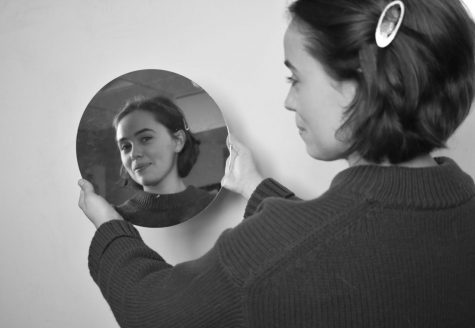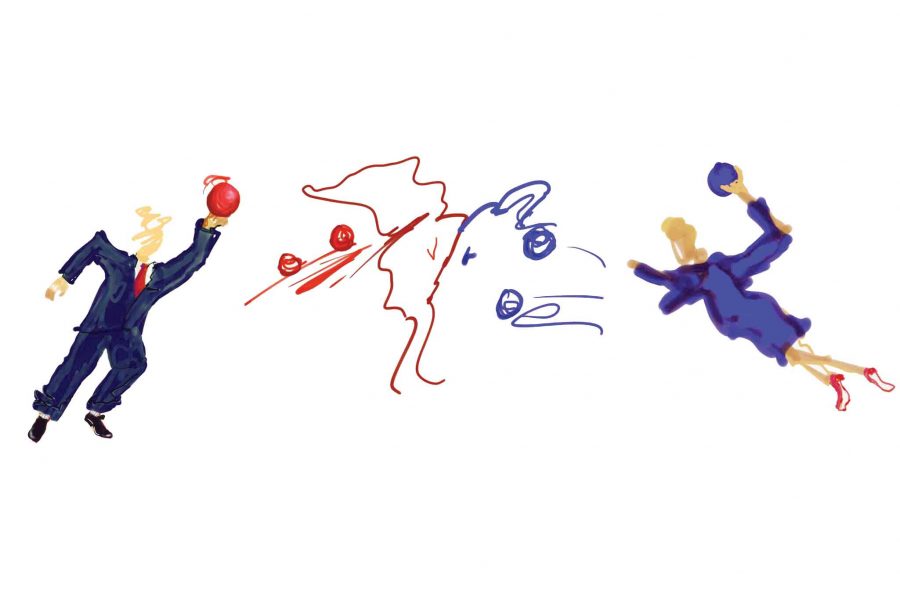Politics fuel cynicism
Cynics often criticize one parties rather than strongly supporting another, compounding a two party system. Politics, then, turns into a dodgeball-like game where people are simply attacking the party they don’t approve of.
For such a polarized system like politics, it is easy when supporting a candidate to reduce other candidate’s views to being trivial or unqualified, purely to shield your own views from being debated. But at the core, candidates bully themselves in this way; through debates, focus can be turned away from policy and centered on flaws in each other. It turns presidential races into games of who has the most dirt, misjudged actions, or questionable politics; but these focal points aren’t necessarily “flaws” rather, they become the pinnacle point of who is supported and who is not.
In some instances, the dirtier the politician, the more attention they get. Although the clean cut candidate is appealing and has proven so in elections, there has always been an attraction to the heftiest, most controversial candidates. Simply stated, they draw in such vast absorption that their views are lost in the shuffle. According to Maddie McConkey ‘16, when considering candidates people tend to “go with whose external image aligns with their beliefs.“ If a candidate just doesn’t look right on an immediate impulse, voters will most likely stray away without considering their policies, sometimes going so far as to develop contempt for anything they do.
In the strew of political news that whizzes through consciouses everyday, the cynical trumps the idealistic. In a time when voters are so polarized within the two-party system, cynicism is the driving force of news consumption, debate, and political conversation. Says David Graham, “it’s hard to embrace and say ‘this is what I believe’ when so much of the discussion is [about] why it’s not perfect.”
It’s clear, though, that the support of one political party can be based on a hate of the opposite party. Even more doubtless is the part of young voters part in this kind of political activity. The inspiration for political jabs are sprinkled throughout the political views of voters, students, and political participators, which is a symptom of the shock heavy news available during the presidential race. Although we expect the news to provide impartial and accurate reports, television news programs, newspapers, and news sites gain reputations for their skewed lenses into the politics. News providers are sometimes so extreme in their representation of the news that it is hard to even know the actual debates going on, just the banter and edited quotes from candidates that liter television screens every day. The focus is brought upon the negative but exciting world of Candidates Yelling at Other Candidates.
When we are blind to actual debates and exposed instead to the drama of politics, the whole idea of it seems ineffective and ill-governed, and turned against the good of the general public. Although, according to McConkey, policies aren’t passed made to purposefully disagree with you. “Lawmakers aren’t trying to pass anything that would be super unpopular,” she says. “Every law that we see, we judge based on how it affects us.”
More often than not, the negativity towards politics funneled through the media makes everything look impossible and risky. But in reality, the ineffectiveness that prevents change is due to a lack of compromise and the actions of individuals, not necessarily the system itself. Say McConkey, “the cynicism in politics is comedy and [says] that you can’t make a difference,” playing into the perception that politics is not a force to be reckoned with.
With the inflated image of refusal between politicians to agree on compromises shows is extended throughout the media as the single narrative of how our government works. Although this is a sad reality in some situations, it supersedes the good work and compromise that is produced by politics. Says Graham, “the reality is is that people who have made the biggest changes are people who had that ideal and didn’t listen to the cynicism.” But do we hear about these people except for in social studies? No. In the current news, the hope for constructive change is practically non-existent, at least in the media’s eyes.
Views of politicians seem to be skewed by the news in an attempt to attract viewers to the excite and drama of politics and political debate. By categorizing and misquoting, the power of how politics are reported goes into the wrong hands and firmly shapes extreme support and invalidation of political parties. But if the stances, beliefs and plans of candidates are distorted, says Graham, “as soon as you [support] a candidate, they may not always live up to all of your expectations.”

Hi! I'm Zoe, this is my 3rd year doing Spectrum! I am thrilled to be a Managing Editor as well as editing the Sci-Tech and Health page. I love Nancy Drew...




